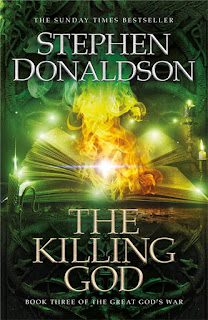The Killing God - Stephen Donaldson
Given it has taken that long, you could be forgiven if you didn't remember the bigger picture never mind the finer details of the story. Stephen Donaldson manages to refresh your memory without seeming to need to do a standard recap. With a couple of incidents and assassination attempts, you are quickly reminded of the menace facing King Bifalt of Belleger and his wife Queen Estie of Amika, forging an alliance that was undoubtedly needed for the danger that was coming their way as the Great God Rile's forces arrive on their way presumably to attack and destroy the library of the Last Repository.
The nature of the Decimates and the wizard-like powers of theurgy that they give to certain individual Magisters had been established to some extent in the first book Seventh Decimate. There is however still other powers that are yet unknown and in The War Within, the second book of the trilogy, that danger was starting to coalesce around the priests of the Church of the Great God Rile, who were swaying the population towards… well, who knows exactly what, but with black ships approaching their shores it certainly poses a threat to the security of the kingdom of Belleger. There are still a lot of "who knows what exactly" left to be clarified in The Killing God.
Donaldson's writing maintains a cool detached tone, lacking in warmth or humour, but you can see that as an advantage or a disadvantage. I'd say it gives the proceedings an air of single-minded, almost documentary-like realism, a tone of grim tension that has been unfaltering, unwavering, taking it all very, very seriously. That extends to the characters who are all deeply affected by what is going on, and they really feel the pain of their experiences, their choices, their losses. And considering that kind of build-up that has taken place in the first two volumes and the dawning awareness of what they are facing, those losses could be considerable. So although it can be wearying at this kind of length, there is every reason and justification for the grave tone that hangs over the whole book.
What I was looking for in The Killing God is a sense that there was a deeper purpose or meaning to The Great God's War as a whole, and that it wasn't just a standard fantasy of warring kingdoms. It's not unreasonable to expect Donaldson to explore deeper underlying issues beyond a struggle between good and evil. Unfortunately, that seems to be the basic form it takes here, of barbarians attacking The Last Repository, evil taking the form of ignorance trying to destroy knowledge and learning. It does also question the viability of pacifism in the library when faced with very real threats to its existence. It's interesting that this is pitched as a fight to retain knowledge against obscurantism and, interestingly in the powers wielded by the priests of the Great God Rile, from religion. There are certainly real-world applications for that in the USA and in many other theocracies, and that is evident in its abstract form without Donaldson having to make any explicit parallels.
Still, even if you look at it in the abstract or grander scheme of things, by the time you get to the conclusion of what amounts to little more than an account of war strategy and bloody battles that almost feel interminable, it's hard to see where Donaldson stands on war, religion and pacifism, if indeed he has a stand on it at all. Either way, the concluding volume of the series fails to follow up on potential of the moral questions raised and doesn't bring anything new to the resolution or indeed the fantasy genre itself. The build up of the first two books was good, the world building, characterisation and tension excellent, as long as you felt it might be going somewhere. Book Three however is inevitably overlong and repetitive, a long series of war tactics and strategies - with the benefit of Magister powers - a long drawn-out series of attack and repulse, retreat and regroup against a largely faceless enemy that appears to have no greater ambitions other than to launch an attack of overwhelming force to destroy everything.
The Killing God, the third volume of The Great God's War is, to be frank, a long, repetitive and torturous read, amounting to around 700 pages of war and killing with little contemplation of the underlying issues it raises and very little in the way of relief. There are brief glimmers of respite from the grim battlefield action in Queen Estie's confrontation with the Magisters of the Last Repository and her gaining knowledge of her power, and Suti al-Suri and the el-Algreb are the only forces that bring some mild light relief from the deeply serious tone adopted elsewhere in King Bifalt's conflict with the Great God Rile, but the characters are mostly remain one-dimensional and one-note. The first two books in the series are worthwhile reads and no-one can say that Donaldson hasn't delivered a war here that lives up to the build-up, but by the time you get to the end of the 700 pages of this final volume - if you even make it that far - it's hard to feel that Donaldson has delivered on the potential of the themes raised in the earlier books.
Reading notes: The Killing God: The Great God's War Book Three by Stephen Donaldson is published by Gollancz on the 17th November 2022. Thanks to the publisher and NetGalley for the advance preview copy.




Comments
Post a Comment